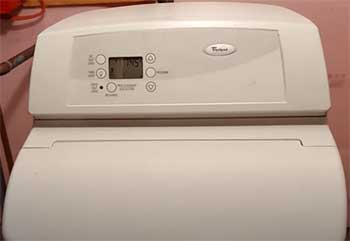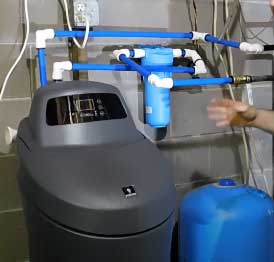Water softeners play a significant role in our households, ensuring that we can drink and use clean, healthy water. Two key players in the water softener industry are Whirlpool and Morton, both with a commendable reputation for producing top-tier products.
Let’s dive into a comprehensive review of Whirlpool and Morton water softeners, considering their pros and cons.
A Brief Comparison Table
| Feature | Whirlpool | Morton |
| Price | High-end | Budget-friendly |
| Lifespan | Up to 25 years | 5 to 10 years |
| Size & Design | Larger | Compact, space-saving |
| Technological Features | Advanced | Basic |
| Installation | May require professional help | Typically DIY |
Whirlpool Water Softeners
Whirlpool is a name synonymous with reliability and longevity in the appliance world. They extend this reputation to their water softeners, which come with an array of features that set them apart.
Pros of Whirlpool Water Softeners
- High-Efficiency Systems

Whirlpool water softeners are known for their high-efficiency systems.
They’re designed with Demand Initiated Regeneration technology, which ensures that the system only recharges when necessary, saving salt, water, and energy.
- Longevity
Another compelling advantage of Whirlpool water softeners is their longevity.
Built to last, these softeners have been reported to function efficiently for up to 25 years or more, depending on the level of maintenance and hardness of water being treated.
- Innovative Features
Whirlpool water softeners come equipped with innovative features like their sixth sense technology, which learns your water usage pattern and optimizes regeneration cycles. This results in lesser salt and water wastage.
Cons of Whirlpool Water Softeners
- Cost
The superior features and longevity of Whirlpool water softeners come at a higher price point. For those on a tight budget, this could be a deterrent.
Morton Water Softeners
Morton, primarily known for their salt products, has ventured into water softening systems and proved their worth.
Pros of Morton Water Softeners
- Compact Design

Morton water softeners are typically compact and designed for smaller spaces, making them an ideal choice for apartments and small homes.
- Easy Installation
The installation process for Morton systems is straightforward and doesn’t require professional intervention, which can be an added expense.
- Economical
Morton water softeners are more budget-friendly compared to other brands, making them an excellent choice for those looking for a cost-effective solution to hard water problems.
Cons of Morton Water Softeners
- Limited Lifespan
While Morton water softeners are economical, they tend to have a shorter lifespan compared to Whirlpool. Many users have reported needing to replace their Morton systems after 5 to 10 years.
- Basic Features
Morton systems do not come with many of the advanced features you would find in a Whirlpool system, which can limit their functionality.
Key Differences Between Whirlpool and Morton Water Softeners
When choosing a water softener, understanding the key differences between models can greatly influence your decision. Here, we’ll delve into the significant distinctions between Whirlpool and Morton water softeners.
- Price Point
As noted before, there’s a substantial difference in the pricing of Whirlpool and Morton water softeners. While Whirlpool tends to be on the higher end of the spectrum, Morton softeners are generally more budget-friendly.
Thus, for those seeking a cost-effective solution, Morton might be more appealing.
- Lifespan
When it comes to longevity, Whirlpool takes the lead. These systems are built for the long haul, often lasting up to 25 years or more, depending on maintenance and the hardness of the water.
In contrast, Morton systems generally last between 5 and 10 years, making them less durable in comparison.
- Size and Design
Morton water softeners are typically compact, designed to fit into smaller spaces. This makes them suitable for smaller households or apartments where space is a premium.
On the other hand, Whirlpool water softeners are larger and might require more space for installation.
- Technological Advancements
Whirlpool water softeners come with more advanced features, such as Demand Initiated Regeneration technology and the sixth sense technology, which optimize water, salt, and energy usage.
These features make Whirlpool systems more efficient but can also contribute to their higher price point. Morton water softeners, while lacking in such features, still provide the basic functionality expected from a water softener.
- Installation
Morton water softeners are generally easier to install and may not require professional intervention, which can save on upfront costs. On the contrary, due to their size and complexity, Whirlpool softeners may require professional installation.
Your choice between Whirlpool and Morton water softeners should hinge on your specific needs and circumstances. If budget and space are constraints, Morton may be your go-to choice.
However, if you’re seeking advanced features and a longer lifespan, investing in a Whirlpool softener could be worth it.
Frequently Asked Questions (FAQ)
Yes, Whirlpool water softeners are known for their efficiency, innovative features, and longevity. However, they are at a higher price point compared to other brands.
While the lifespan can depend on various factors like the hardness of water and maintenance, Whirlpool water softeners have been reported to last for up to 25 years or more.
A Morton water softener typically has a lifespan of 5 to 10 years, depending on maintenance and the hardness of water being treated.
Yes, it does matter. The type of water softener you choose should depend on your specific needs, such as the size of your household, your water hardness level, and your budget.
Wrapping Up
In conclusion, both Whirlpool and Morton water softeners have their strengths and weaknesses. While Whirlpool stands out for its efficiency, innovative features, and longevity, it comes at a higher price point.
On the other hand, Morton offers a compact, budget-friendly option but with a shorter lifespan and basic features. Your choice between the two should depend on your specific needs and preferences.
